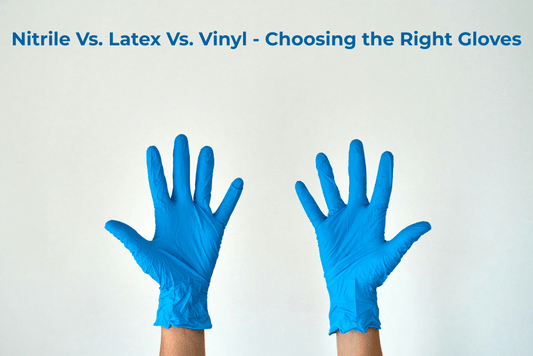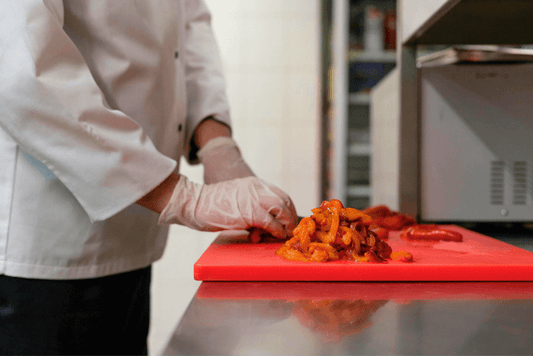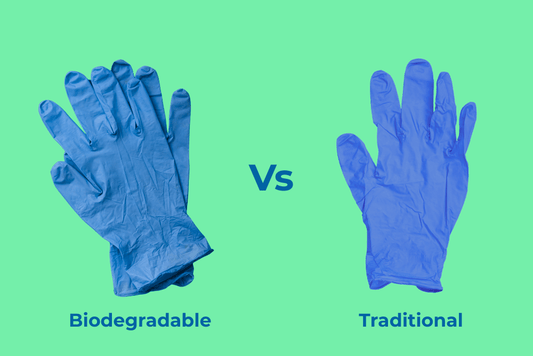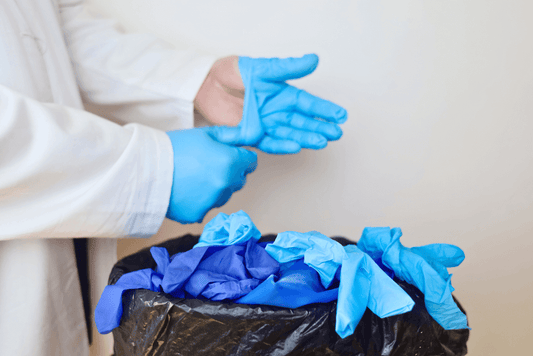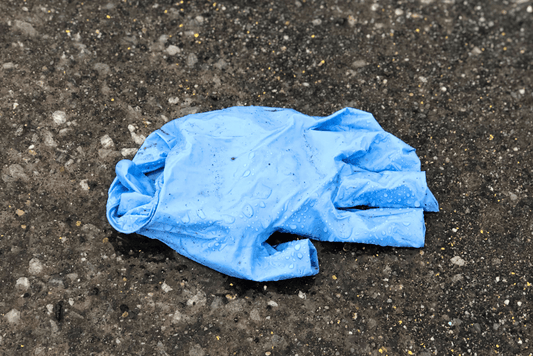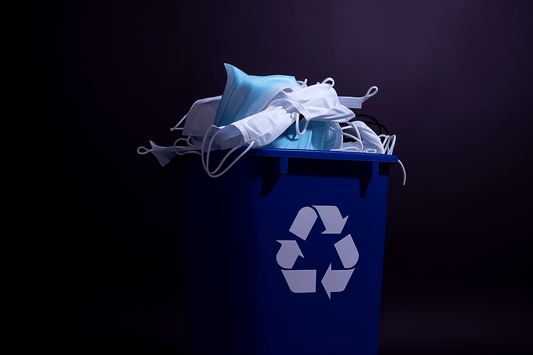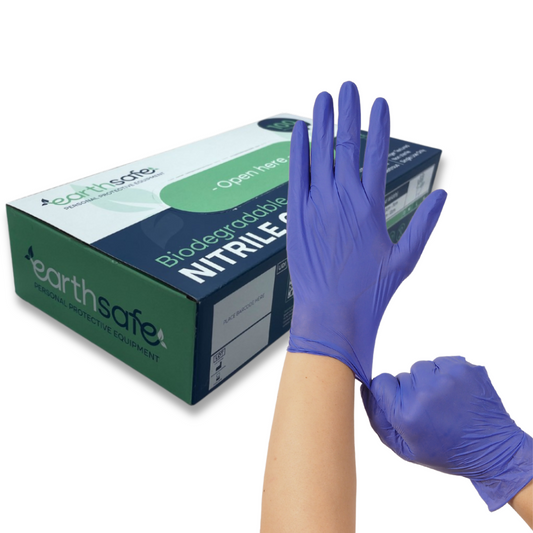Can You Recycle Disposable Gloves?
Disposable gloves are used in countless settings, from healthcare and laboratories to food handling and home tasks. Their convenience and protection make them indispensable. Yet, their widespread use raises questions: Can disposable gloves be recycled? How should they be handled to minimize environmental impact? This article examines practical recycling options, challenges, and actions for both organisations and individuals.
Understanding Disposable Gloves
Most disposable gloves are made of nitrile, latex, or vinyl. Nitrile is synthetic, offering chemical resistance, puncture strength, and durability. Latex comes from natural rubber and is elastic, while vinyl is a lightweight, cost-effective option. Each material has different properties, which influence disposal methods.
Used gloves cannot always enter standard recycling streams. Contamination from food, chemicals, or biological matter limits processing options. Understanding the material and the context of use is crucial in determining the appropriate disposal route.
Recycling Possibilities
Certain programmes allow gloves to be recycled. These specialised systems collect gloves and process them at dedicated facilities. Gloves are cleaned, shredded, and transformed into new products, such as flooring, industrial mats, or other rubber goods. These processes convert waste into usable material while reducing landfill contributions.
Accessibility is limited. Many collection systems target businesses rather than individual households. Large-scale recycling requires infrastructure and trained personnel to handle contaminated or mixed materials.
General Waste Options
For most consumers, disposable gloves will end up in general waste. If gloves have come into contact with food, oils, or household cleaning agents, they are usually discarded in regular bins. Waste processors may incinerate these gloves, producing energy and ash. Modern facilities often capture emissions, reducing environmental impact.
While general waste is not ideal for sustainability, it remains the most practical solution for users without access to specialised collection services. Proper disposal in bins prevents littering and keeps gloves contained until processing.
Healthcare and Laboratory Considerations
Gloves used in medical or laboratory environments must follow stricter protocols. They may carry biological or chemical contaminants. Hospitals and clinics place such gloves in approved medical waste containers, which are collected and treated via high-temperature incineration at certified facilities. Laboratories follow chemical disposal regulations if gloves are exposed to hazardous substances.
These systems prioritise safety while managing waste responsibly. Following established protocols avoids cross-contamination and maintains compliance with regulations.
Reducing Waste
Although disposable gloves are designed for single use, some measures can reduce volume. In non-hazardous tasks, gloves may be worn more than once. Training staff to use gloves efficiently, removing layers only when necessary, can limit waste.
Choosing reusable alternatives, such as rubber or PVC gloves, for less critical tasks also decreases disposable glove usage. Reducing unnecessary consumption complements recycling efforts and supports sustainable practices.
Industrial Recycling Programmes
Several companies now provide structured glove recycling services. Businesses receive collection bins or boxes specifically for gloves. When full, these containers are shipped to processing facilities, where gloves are cleaned, shredded, and repurposed.
Products from recycled gloves include floor tiles, mats, and rubberised tools. Such programmes are especially effective in healthcare, dental practices, and manufacturing environments with high glove turnover. Subscription fees or service costs may apply, but the environmental benefit often outweighs the expense.
Obstacles to Recycling
Widespread glove recycling faces several challenges:
-
Contamination: Organic matter, oils, and chemicals reduce the feasibility of processing.
-
Separation: Mixing nitrile, latex, or vinyl complicates recycling streams.
-
Economic factors: Collection, cleaning, and processing costs can exceed the value of recycled materials.
Overcoming these challenges requires cooperation between manufacturers, recyclers, and regulators.
Legislation and Policy
Government rules increasingly influence glove disposal. Some regions mandate the separation of disposable gloves from general waste, encouraging recycling services. Incentives like subsidies or tax relief support companies adopting environmentally friendly practices.
Future regulations may require gloves to be designed for recyclability or mandate participation in collection programmes. Organisations that prepare now are better positioned for compliance.
Consumer Actions
Individuals can also contribute. Gloves used for household cleaning or gardening can typically go into general waste. For bulk users, local drop-off schemes may offer recycling options.
Consumers should buy quantities that match actual needs and consider reusable alternatives when appropriate. Awareness of product labeling and disposal instructions helps prevent unnecessary waste and supports local recycling efforts.
Business Responsibilities
Organisations that use disposable gloves extensively have a greater responsibility. Conducting audits on glove usage identifies opportunities for reduction. Storing gloves properly avoids damage and contamination, limiting premature disposal.
Training staff on correct removal, disposal, and separation methods ensures compliance and reduces environmental impact. Partnering with recycling providers offers a structured route for managing waste and advancing corporate sustainability objectives.
Innovation in glove production continues. Biodegradable options are emerging, enabling gloves to break down more quickly under landfill conditions while maintaining their protective properties. These alternatives can reduce environmental impact without compromising safety.
Expansion of recycling infrastructure will improve access to glove collection services. As public understanding grows, demand for responsible disposal practices is likely to rise, pushing businesses and consumers toward sustainable solutions.
Practical Guidance
The appropriate disposal method depends on the glove type and use context:
-
Medical or laboratory use: Follow hazardous or clinical waste protocols.
-
Industrial use with chemicals: Use licensed hazardous waste services.
-
Household use: General waste is acceptable unless local recycling options exist.
-
Large-scale organisational use: Engage commercial recycling programmes or take-back services.
Responsible disposal helps minimise environmental impact while addressing the realities of glove use.
Upgrade your operation confidently! Our FDA-compliant biodegradable nitrile gloves deliver the protection and assurance you need to meet the highest food safety standards, all while providing a simple, positive step toward sustainability. Contact our sales team immediately for verified product certifications and bulk pricing: Call +44 7482 212945 or visit our contact page.


